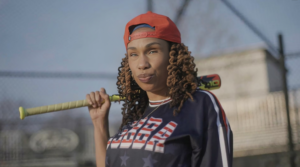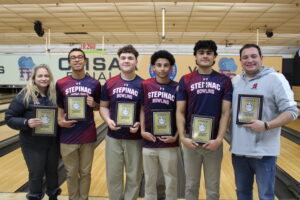 Through bake sales, braille bracelets, and brotherly support, Stepinac students are raising funds for an upcoming documentary that will amplify the profile of blind baseball in America, culminating in a school visit and demonstration from members of the official U.S. blind baseball team on October 29.
Through bake sales, braille bracelets, and brotherly support, Stepinac students are raising funds for an upcoming documentary that will amplify the profile of blind baseball in America, culminating in a school visit and demonstration from members of the official U.S. blind baseball team on October 29.
Throughout October, Stepinac students and staff will be soliciting funds through initiatives such as bake sales and the sale of braille bracelets to support a groundbreaking sports documentary directed by two female filmmakers. The documentary will chronicle 25 blind athletes in New York who are defying stereotypes and expectations as they compete internationally and work to grow the adaptive sport of blind baseball in America—with the goal of securing a place for the sport in the Paralympic Games.
On October 29, students will present the funds raised to the filmmakers and players from the official U.S. blind baseball team. The players, Kiana Glanton and Zach Ship—both native New Yorkers—will share their vision impairment and athletic journeys with the Stepinac students during outdoor assemblies that will also feature interactive demonstrations of the foundational skills and rules of blind baseball.
What is more American than baseball? That is why the fast-rising adaptive sport of blind baseball is a notable change for low vision and blind athletes across the United States. The yet-to-be-titled documentary chronicles trailblazing athletes who are training for the second-ever Blind Baseball World Cup, where they will compete against teams from Great Britain, China, Cuba, and more. The film aims to show audiences what is possible when one believes in the impossible.
For the two directors, Jessica Massa and Carla Borrás, the film and philanthropic efforts of Stepinac students carry deep personal meaning. Massa, a Westchester native who grew up in nearby New Rochelle, carries a genetic vision loss disease called Doyne Honeycomb Dystrophy that left her mother legally blind. “Throughout my youth, I knew of Stepinac as a sports powerhouse and a bastion of respect and service,” says Massa. “Coming back to Westchester and getting to witness the school’s passion and support for blind baseball and the incredible players who are defining the future of the sport has been a dream come true.”
As for Borrás, she grew up with a dad from Puerto Rico, where baseball was life, and spent the last 15 years telling deeply reported, underrepresented stories for the PBS series Frontline. “My dad, Papi, as I call him, had me playing baseball from the time I could swing a bat, and when I first met these athletes, I knew instantly that, between my upbringing and my experience at Frontline, this was a story in need of telling.”
While the film they are directing is at its core a sports documentary, it also aims to highlight the systemic inequalities in the U.S. that prevent people living with disabilities from accessing the same experiences that others take for granted. The benefits of team sports are well-documented: fitness, learning to work with others, striving toward shared goals, and a sense of belonging. Yet historically, most adaptive sports for the blind remain at the individual level—swimming, track, powerlifting—meaning that many visually impaired people are denied the full athletic experience that sighted people enjoy from childhood on.
At Stepinac, the students and staff have chosen to focus their attention on this film for multiple reasons. Michael O’Donnell, Director of Athletics, states, “As LoHud Sports’ School of the Year, Stepinac has a long-standing tradition of excellence in athletics. I am so proud our students have come together to support a cause that will ensure all individuals are given equal opportunities on the field.”
Principal Paul Carty adds, “Blind baseball exemplifies the power of resilience, determination, and teamwork. Designed for athletes with visual impairments, it breaks barriers and shows that no challenge is too great when passion and ingenuity combine. This sport allows participants to experience the joy of competition, the thrill of accomplishment, and the deep camaraderie that sports foster. With every swing of the bat and every strategic move on the field, players prove that limitations are not defined by disability but by how much heart and effort one puts into the game. This adaptive sport is more than just a game—it’s a testament to the human spirit, showing that everyone deserves the opportunity to play, compete, and excel.”







